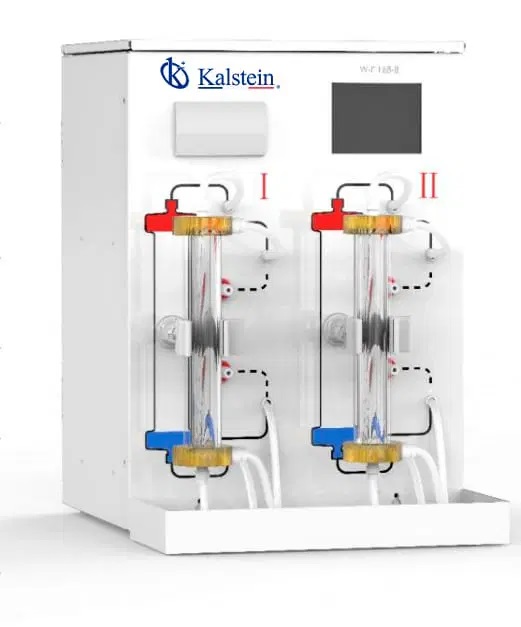The dialyzer reprocessing machine is an essential tool in modern medical laboratories. Its primary function is to sterilize, clean, test, and infuse reusable dialyzers, which are crucial for hemodialysis treatment.
Are you yearning for top-tier medical equipment, ready to enhance the efficiency of your laboratory? Visit https://kalstein.co.in/category-product/medical-line/hemodyalisis-machines/ to explore our high-end catalog, packed with the best finds at the most competitive prices. Excellence marks our brand, we innovate and manufacture high-precision equipment, both reliable and durable to meet your needs. Why wait? Make your quick and secure online purchase, take the leap towards the future of medical technology today. https://kalstein.co.in/
Dialyzer Reprocessing Machine by Kalstein
The dialyzer reprocessing machine is designed to meet the most demanding needs of medical laboratories.
Having had the opportunity to use this equipment, I can attest to its exceptional performance. This machine not only facilitates the work of medical staff but also ensures that dialyzers are in perfect condition for reuse, which is vital for patient health.
Features of the Dialyzer Reprocessing Machine
Key features of this machine include:
-
High Efficiency: Capable of reprocessing one or two dialyzers simultaneously in a record time of 12 minutes.
-
Automatic Disinfectant Dilution: Ensures precision and safety in each cleaning cycle.
-
Dual Printing Design: Includes a built-in printer and the option for adhesive sticker printing.
-
Extensive Data Storage: With over 160 GB storage capacity, it allows storing relevant patient data for over 50 years.
-
Compatibility with Various Disinfectants: Saving up to 90% in costs.
-
Infection Prevention Technology: Uses patented polymer joints to prevent cross-infections.
These features ensure that the machine is not only efficient but also safe and economical in its operation.
Why Does the Dialyzer Reprocessing Machine Have This Price?
The price of the dialyzer reprocessing machine is justified by the high technology and competitive advantages it offers. Its advanced design and innovative features such as automatic disinfectant dilution and extensive data storage add significant value.
Additionally, its capacity to reprocess multiple dialyzers simultaneously reduces operational time and costs, representing a long-term investment for any laboratory.
Comparing the Dialyzer Reprocessing Machine with Similar Products
Comparing the machine with other market brands, such as Poweam Medical and Ysenmed, reveals several key advantages:
-
Efficiency: The Kalstein machine can process two dialyzers simultaneously in 12 minutes, while other brands like Poweam offer similar processing time but with fewer advanced infection prevention features.
-
Data Storage: Kalstein offers superior storage capacity, allowing data to be stored for over 50 years, a feature not widely available in other brands.
-
Compatibility and Safety: Kalstein’s advanced infection prevention technology is superior compared to Ysenmed, ensuring greater patient safety.
Pros and Cons of the Dialyzer Reprocessing Machine
|
Pros |
Cons |
|
High efficiency in reprocessing |
High initial cost |
|
Automatic disinfectant dilution |
Requires trained personnel to operate |
|
Extensive data storage |
Needs regular maintenance |
|
Dual printing design |
Bulky size |
|
Compatible with various disinfectants |
Continuous electricity dependency |
|
Advanced infection prevention technology |
Initial investment in consumables |
|
Ability to process two dialyzers simultaneously |
Requires specialized installation |
|
Long-term operational cost savings |
Advantages of this Dialyzer Reprocessing Machine
The advantages of this machine are numerous, spanning from operational efficiency to patient safety. By being able to reprocess two dialyzers simultaneously, it significantly reduces waiting time and associated costs. Its data storage system ensures that all relevant information is available for years, which is essential for medical follow-up.
Additionally, its infection prevention technology guarantees that each dialyzer is completely sterilized and safe for reuse.
Other Benefits of this Dialyzer Reprocessing Machine
Beyond the technical features, this machine contributes to laboratory sustainability by reducing the use of disinfectants and other consumables.
Its efficient design not only saves time but also resources, making the reprocessing of dialyzers a more eco-friendly and economical task.
Customer Reviews of the Dialyzer Reprocessing Machine
Users who have implemented this machine in their laboratories highlight its reliability and efficiency. Many mention that the reduced reprocessing time has allowed them to increase the number of patients treated daily.
Others value the ease of use and the safety it provides, especially regarding the prevention of cross-infections.
Frequently Asked Questions
How long does it take to reprocess a dialyzer?
The machine can reprocess a dialyzer in approximately 12 minutes.
Is it compatible with all disinfectants?
Yes, it is compatible with a wide range of disinfectants, saving up to 90% in costs.
How much data storage capacity does it have?
It has a data storage capacity of over 160 GB, sufficient to store information for more than 50 years.
Can it be used in any hospital?
Yes, it is designed for hospital use and complies with all safety and efficiency regulations.
How easy is it to maintain?
It requires regular maintenance, but its design is intended to facilitate these tasks and prolong its lifespan.
What advantages does it offer compared to other brands?
It offers higher efficiency, compatibility with multiple disinfectants, advanced infection prevention technologies, and unparalleled data storage capacity.
Conclusions on this Dialyzer Reprocessing Machine
In conclusion, the Kalstein dialyzer reprocessing machine is a valuable investment for any medical laboratory. Its combination of efficiency, safety, and data storage capacity makes it superior to many other options on the market.
With advanced features that ensure infection prevention and economical operation, it is an essential tool for improving the quality of hemodialysis treatment and optimizing laboratory resources.


